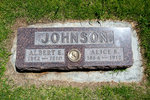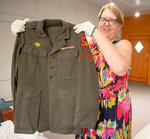Clear, 66° F
It’s impossible to know if Albert E. Johnson and Frederick A. Herbaldsheimer were friends or just co-workers. But since Feb. 13, 1910, the two names, though not well-known, have been …
This item is available in full to subscribers.
The Powell Tribune has expanded its online content. To continue reading, you will need to either log in to your subscriber account, or purchase a subscription.
If you are a current print subscriber, you can set up a free web account by clicking here.
If you already have a web account, but need to reset it, you can do so by clicking here.
If you would like to purchase a subscription click here.
Please log in to continue |
|



It’s impossible to know if Albert E. Johnson and Frederick A. Herbaldsheimer were friends or just co-workers. But since Feb. 13, 1910, the two names, though not well-known, have been inseparable in the history of the northwest Wyoming city of Powell.
The two men died following their descent into a cold, dark well — one while he was trying to save the life of the other.
Recently, a Sheridan family descended from Johnson, who received a national medal for his heroic rescue attempt, learned of his story and came to Powell to honor him for the bravery he displayed more than 100 years ago.
The streets of Powell were little more than dirt in 1910. The town was only 1 year old, but it already had a reputation as a caring community —partly due to the heroics of one of its first citizens, Albert E. Johnson.
Johnson, 47, homesteaded in Powell in 1909 when there was little to call it a town. The Bureau of Reclamation, which was called the U.S. Reclamation Service at the time, had an office in Powell; one of the few structures in the city limits along with a couple of places of business and a smattering of quickly assembled homes and canvas tents.
Without water, directed to Powell in the form of the canal carrying snowmelt from the Absaroka Range, the city would have remained part of the desert in the Big Horn Basin. The agency helped to provide this town — and many more across the West — with life-giving water, said Mahonri Williams, spokesman for the agency, in a recent interview.
A farmer and a well digger, Johnson and his wife, Alice, had seven children. His granddaughter, Ada Jinks, was the first child born in the new city. Herbaldsheimer, 28, was Johnson’s laborer, according to accounts in the then-treeless hamlet’s newspaper, the Powell Tribune.
On that cold day in February, several men were digging a well. Herbaldsheimer had gone down in the 50-foot-deep hole and then passed out due to gases being released. Against the advice of others, Johnson went in after him, attaching a rope to Herbaldsheimer when he found him.
The men at the other end of the rope were excited when they heard Herbaldsheimer moaning as Johnson tied him to the rope. The reports are unclear, but the men evidently waited for word from Johnson to pull him up. Unfortunately, the young man was dead by the time he got to the street level some 15 minutes later.
Johnson was brought up next. He recovered consciousness during the day but died the following day, Valentine’s Day.
Funeral services were held at Union Presbyterian Church the following Thursday afternoon on Feb. 17. Reverend Clark of Garland occupied the pulpit at the time.
Then the two were laid to rest near each other at Crown Hill Cemetery, east of town.
Though there are no known reports of how the story of Johnson’s selfless act of heroism reached the folks at the Carnegie Hero Fund, they later awarded the Hero Medal to him posthumously.
The mission of the organization is to recognize and support those who perform acts of heroism in civilian life in the United States and Canada.
“We live in a heroic age,” the industrialist and philanthropist Andrew Carnegie wrote in the opening lines of the Commission’s founding Deed of Trust in 1904. “Not seldom are we thrilled by deeds of heroism where men or women are injured or lose their lives in attempting to preserve or rescue their fellows.”
Carnegie’s charity, administered by a 21-member commission in Pittsburgh, was charged with honoring those who he called the “heroes of civilization.”
A candidate for an award must be a civilian who voluntarily risks his or her life to an extraordinary degree while saving or attempting to save the life of another person, according to the commission’s website. There must be conclusive evidence to support the act’s occurrence, and the act must be called to the attention of the commission within two years.
Those selected for recognition by the commission are awarded the Carnegie Hero Medal, and they, or their survivors, become eligible for financial considerations, including one-time grants, scholarship aid, death benefits, and continuing assistance.
To date, more than 10,000 medals have been awarded, the recipients selected from more than 100,000 nominees. About 20 percent of the medals are awarded posthumously.
Fast forward 120 years and Kathy Reynolds, of Sheridan, Wyoming, decided to do a family tree while on lockdown during the COVID-19 pandemic.
“It became a hobby right before COVID, and then it developed greatly during the lockdown,” she said.
She soon enlisted the help of her family, including her husband Jeremy and their two children, Ezekial and Trinity. When they discovered the name of Albert Johnson while doing research, they learned of his story of heroism.
They came to Powell to research another possible relative and learned of the Hero Medal, as well as the story of how he earned it.
As far as they can tell, the medal awarded to Johnson was lost over the years. However, in their research they learned he was due a gravestone marker from the commission. They applied for the marker and received the package in the mail within days.
Along with Don and Brenda Reynolds, the family traveled back to Powell over the Independence Day holiday weekend to give Johnson the recognition he deserved. Don Reynolds is his great-great-grandson.
Don, who was born in Thermopolis, said the search helped him to answer questions about his heritage. “Sometimes you think about why am I the way I am?” Don said. “Well, when you start finding out more and more about your heritage and your family, it’s like, well, this makes a whole lot of sense. Because Wyoming has always been my home. But it’s also in our DNA. It’s in our blood.”
Jeremy said finding their heroic relative helped to pinpoint his feelings toward their chosen home.
“I’ve always felt at home in Wyoming,” he said. “There’s just such an established family system here. It’s remarkable. And it’s humbling.”
Family members gathered around the modest headstone near the entrance of the cemetery. They affixed the medal permanently to the warm stone, took pictures to commemorate the special family event and had some quiet moments alone in the cemetery. They couldn’t stay too long as the mosquitoes were on a rampage.
Before they returned home, they wanted to thank Brandi Wright, director and curator of the Homesteader Museum.
“We’re just really grateful for the museum here. Especially the curator,” Don said. “She did her very best to just open everything that she could and let us have access to this part of our history.”
Wright helped the family research other possible relatives, as well as provide an idea of what Powell was like at its inception.
Wright said the town was still young and under construction when Johnson came to Powell.
“There was hardly anything on main street, and not much else” in those early years, she said while showing historic photos of the city.
“It was bleak in terms of the landscape, but not in the sense of community,” she said. “I think one thing that has always been so wonderful about Powell, when you’re reading [historical documents], is that they still had the sense of community where people helped each other. Powell pride; it has always been here.”
The Reynolds family is still collecting information about the Johnson family and its history, hoping to uncover more clues about the Reynolds heritage.
There was another Albert E. Johnson who lived in Powell — a possible relative — who fought in WWII in the Marines. His full uniform is part of the collection at the museum. The Reynolds family hopes he might be yet another clue to the beginnings of their extended family in Wyoming.
It’s still unclear whether he was a relative, but they will continue to dig, having finally returned the Hero Medal to one of their forefathers.